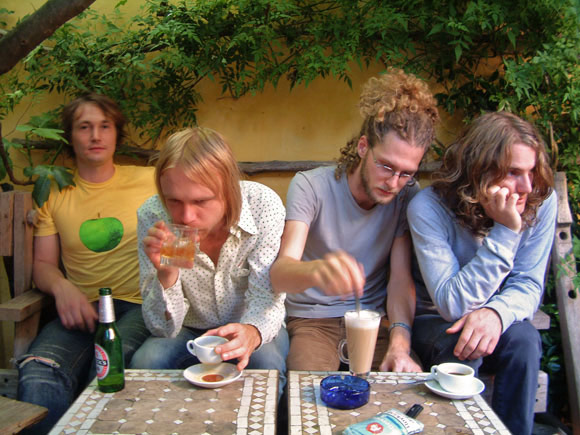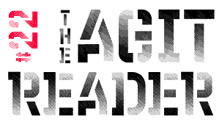
Re-contextualizing the Eye of Your Mind
by Kevin J. Elliott
There’s a fine line between being retro and being a revisionist, one with which Gustav Ejstes, the Swedish wunderkind behind Dungen, is all too familiar. While not a child of the ‘60s, Ejstes certainly has a link to that era—through scratched-up second-hand albums passed down a generation or pure emotive telepathy is uncertain—but he’s undoubtedly obtained the magic dust that allows his recordings to stand out as more than mere re-treads over Axis: Bold as Love or Easter Everywhere. As Dungen, his connection to these keystones of psychedelia seems to come from necessity instead of choice. While the casual listener could nitpick through the riffs and charge Ejstes as charlatan, deeper understanding of Ta Det Lungt or Tio Bitar finds the artist painting over a used canvas with vivid swaths of color and texture.
In the past, it was also quite a feat that Ejstes created Dungen as an individual. The wild patterns of flute and fiddle, piano and drums, were completely recorded by Ejstes himself. Now with 4, Dungen enters an enlightening new era as he’s recruited a full band to help in his quest. The result of that communal presence is found in 4, where the mood arrives as a more nuanced affair, one that finds Ejstes able to focus on thick layers of reverb and the intricate labyrinths of melody buried beneath, while his group flails in psychedelic sorcery around him. While this record may not be as immediate as the its predecessor, Dungen have never released an album that reveals their innate truths directly on the surface.
I recently caught up with Ejstes during his brief American tour, where I found out, among other things, that he was ready to give up Dungen before creating what is arguably his band’s greatest triumph so far.
From what I’ve read, it sounds like you grew up in a very musical family. What’s your earliest memory of this in your household?
Gustav Ejstes: Both my parents are musicians, so there was a lot of music. My dad actually stayed home with us while my mother worked full-time. He had courses in fiddle instruction out of our home. So I remember, me and my brother watching a circle of 10 people gathered around him learning fiddle. I suppose that’s the earliest memory because we were quite young then.
Living in a pretty remote village of Sweden, did you get more influence from your father and his record collection than from what was current at the time?
GE: I guess so, because I was growing up in the countryside, we were pretty secluded. This was the early ‘80s and we had like two TV channels and three radio stations. It was, of course, good for creativity, so we were making our own stuff pretty early. I was reading an interview with Joni Mitchell, and she was saying how growing up her parents only had two records. My parents had about ten records each, so there wasn’t a whole lot to hear. Now with the MP3s and all the ways you can have music, I can’t imagine how many things children are being pumped with at an early age.
It was your first album that really drove me to search through the Swedish archives, discovering bands like Trad Gras och Stenar and guitarists like Pugh Rogefeldt in the process. Are these artists that you feel did something unique to the entirety of psychedelic music?
GE: I think that the first band you mentioned were actually trying to do something that was Swedish or doing something that was by them. We have actually been talking about them because they have this idea that most music is seen as entertainment by itself, but they would rather invite the crowd in and make it an event. Like them, we have a lot improvised parts, especially live, so we don’t want to walk off the stage every night and be upset that we didn’t play all the right notes. It’s more about creating the atmosphere and the vibe, and I think those guys were into that, much more than playing cool hard rock.
You’ve said that discovering hip-hop was your “punk phase.” Can you give any more detail to why to you that music was punk?
GE: It was when I was 10 or 11. I grew up with folk music in my house, so it was some kind of anti-statement that I made. It’s music that is like a marching band, like fighting a war. For me, as a teenager, I connected with that. I guess I’m still a teenager because I’m still into that music today. There’s something about all of it that’s beautiful at the same time.
You’ve also linked your production style as that of a hip-hop producer. How so?
GE: Not really now, that influence you would have to see objectively. When I was 13 or 14 we had a bad computer that allowed us to sample things and what we made, I guess, you could call hip-hop.
Playing all of your own instruments was I assume out of necessity. So now with a full-band in place do you ever feel you’ve lost some control over how the songs sound?
GE: No, definitely not. It’s only because I have such great musicians around me and they have the same ideas that I have. What I’m doing right now, they are totally making it complete.
What was your intent on 4? How were you trying to differentiate this album from your others?
GE: I didn’t really have any intentions. Actually, my intention before this was to quit again and not do it anymore. Six or seven months in this house, where I had a piano from my grandmother, I wrote some songs and decided I needed to do another record. One of the main differences from the early records is that I played around with the songs for a really long time before I recorded them. I used to not have any patience. I would write a song and record it by myself immediately. So with this I wanted to see how the song would develop over a long period.
I asked earlier about your hip-hop. Have you ever thought of doing a project that didn’t rely so much on psychedelic rock and traditional instrumentation?
GE: No, but right after Tio Bitar I moved to a house in Paris and I had a plan to just practice scratch and turntable music. I bought a sampler and learned how to use it. It’s not my way of making music, though. I looped stuff up, and when I was done, I sat there and thought it sounded nice but I wasn’t sure where to go from there. I guess my goal and way to express myself is playing instruments. One of my idols right now is Madlib and he’s using the sampler as an instrument. He’s a composer and knows how to be delicate. I know it’s not easy to make sample-based music.
